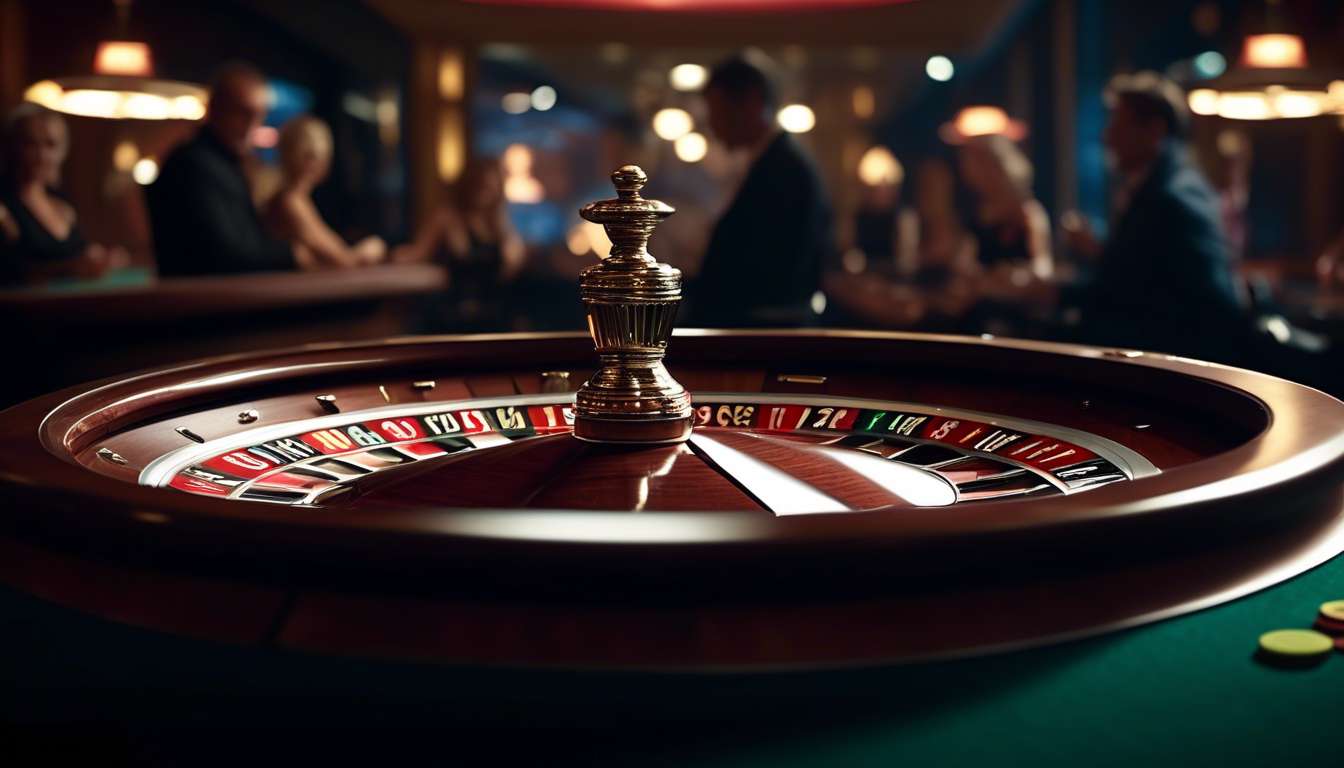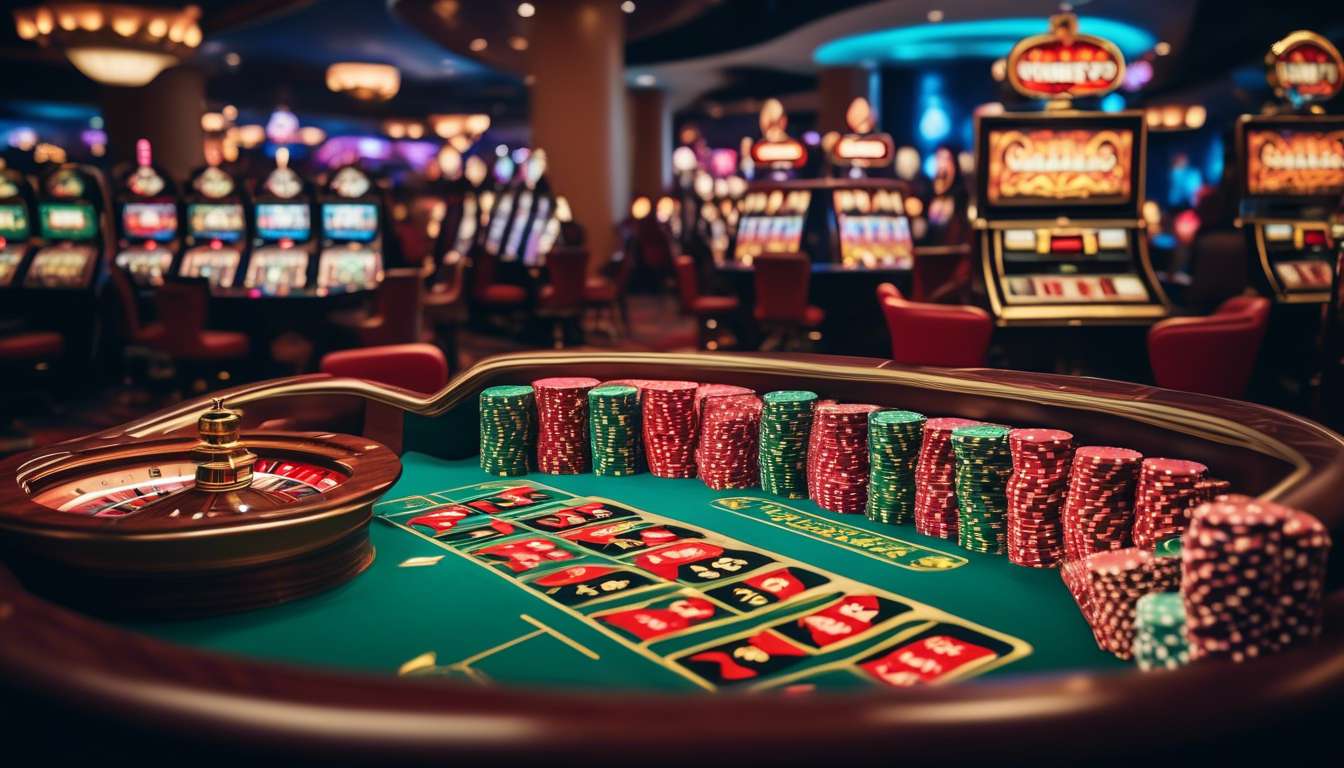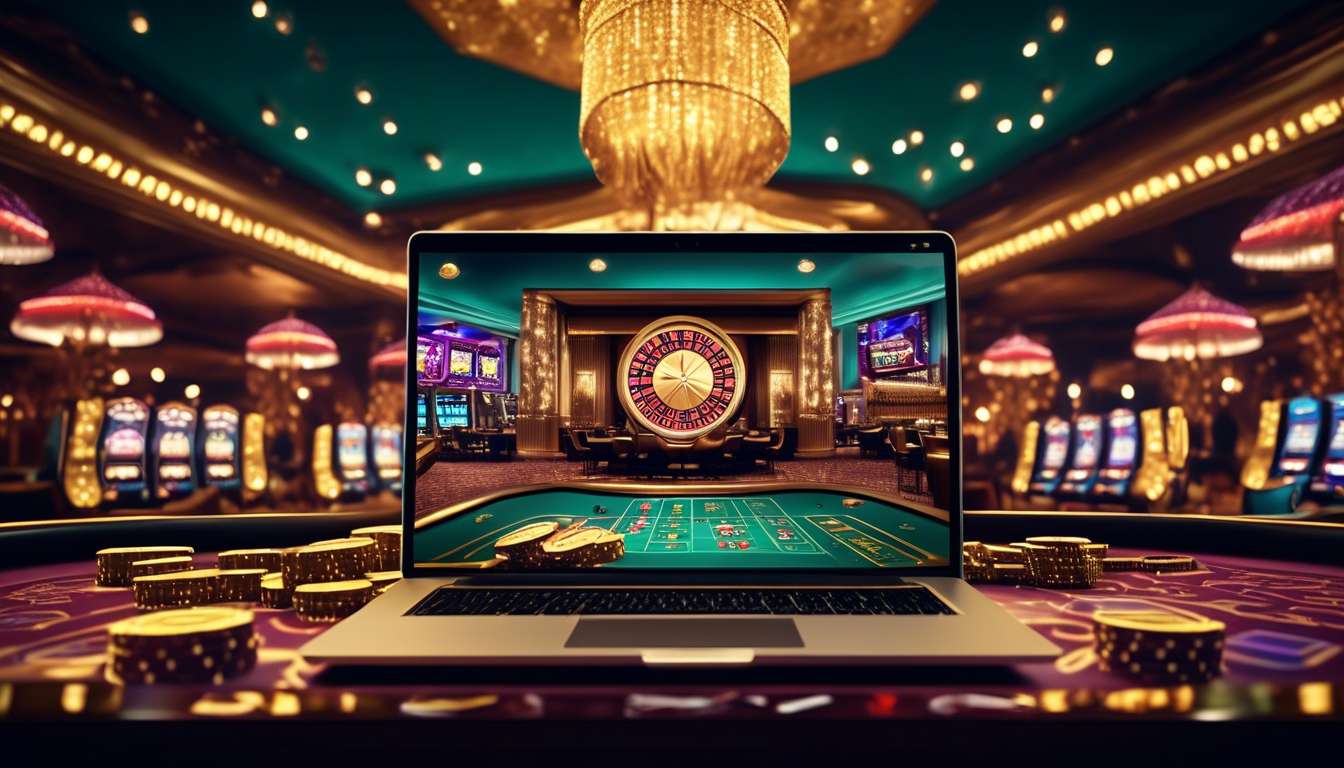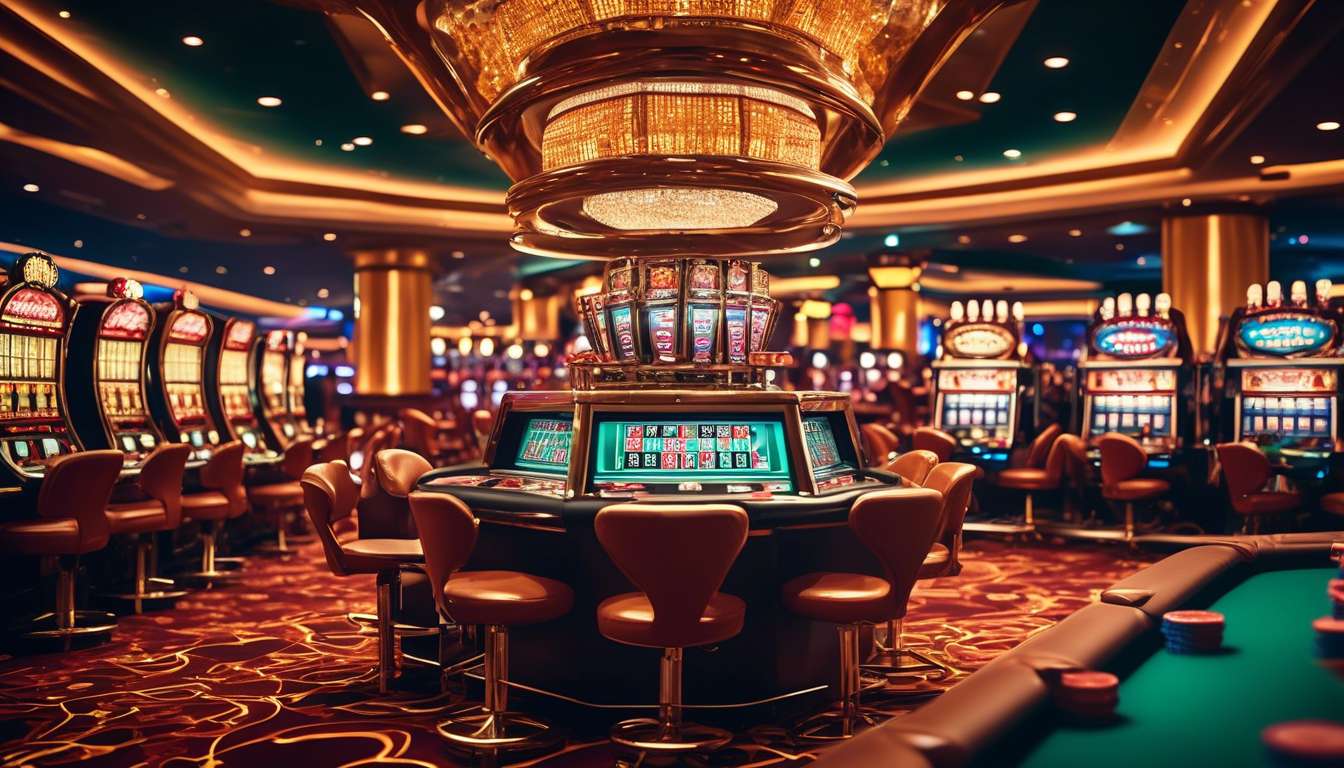Entering the World of Gambling
When we step into a casino or log onto an online gambling platform, we are entering a world filled with the tantalizing promise of easy rewards and the thrill of risk. Gambling is not just a game of chance; it’s a complex psychological phenomenon that captivates millions of us worldwide.
Exploring the Psychology of Gambling
In this exploration of the psychology of gambling, we delve into the reasons why we are drawn to the spin of the roulette wheel or the shuffle of cards.
Cognitive Biases and Overestimation
We examine the cognitive biases that lead us to overestimate our odds of winning. These biases can significantly influence our gambling decisions, often leading us to place bets based on perceived patterns or luck rather than actual probabilities.
Emotional Highs and Lows
The emotional highs and lows associated with gambling are powerful motivators that keep us coming back for more. The thrill of a potential win and the disappointment of a loss create a cycle that can be both exhilarating and addictive.
Allure of Gambling and the Brain’s Reward System
Gambling taps into our brain’s reward system, releasing dopamine and creating a sense of pleasure and excitement. This biological response contributes to the allure of gambling and explains why it can become an irresistible activity for some individuals.
Susceptibility to Gambling
Some people are more susceptible to the charms of gambling than others. Factors such as personality traits, genetic predispositions, and personal experiences can increase one’s vulnerability to developing a gambling problem.
Navigating Entertainment and Addiction
By understanding these psychological factors, we can better navigate the fine line between entertainment and addiction. Awareness of the cognitive and emotional aspects of gambling can help individuals make informed choices and maintain a healthy relationship with this popular pastime.
The Allure of Gambling
Gambling’s Allure
Gambling’s allure lies in its potent mix of risk, reward, and the thrill of the unknown. We find ourselves drawn to the excitement of placing a bet, the heart-racing anticipation of the outcome, and the camaraderie shared with others who partake. This shared experience creates a sense of belonging, a feeling we all crave.
The Dopamine Effect
When we gamble, our brains release dopamine, the neurotransmitter that makes us feel pleasure and reward. This chemical rush can be incredibly enticing, making us want to experience it again and again.
The Slippery Slope of Addiction
However, the excitement can quickly lead down a slippery slope. Gambling addiction isn’t just about the money; it’s about the brain’s response to that dopamine hit.
- Our cognitive biases can cloud our judgment.
- We may start believing we’re just one game away from a big win.
Community Support
Together, as a community, we must recognize these patterns and support each other, ensuring that the allure of gambling doesn’t lead to destructive habits.
Let’s enjoy responsibly and look out for one another.
Cognitive Biases in Gambling
Our minds often play tricks on us, making us believe we’re in control when we’re not. In gambling, this illusion is amplified by cognitive biases, leading us down a path of potential gambling addiction.
The Gambler’s Fallacy is a key cognitive bias. We might think we’re on the verge of a big win, expecting past events to influence future outcomes. Yet, each spin or card draw is independent.
These biases trigger dopamine release, which fuels our excitement and anticipation. This chemical rush can cloud our judgment, making us:
- Chase losses
- Ignore the odds stacked against us
We feel like part of something bigger, connected in the shared thrill of the game. However, it’s crucial to recognize how these emotions can lead to poor decision-making.
As a community, let’s take action:
- Recognize these cognitive biases.
- Support each other in making informed choices.
- Share insights about how our brains work during gambling.
- Protect ourselves from the pitfalls of addiction.
Together, we can enjoy the game responsibly and keep our minds in check.
Emotional Rollercoaster of Gambling
The Emotional Rollercoaster of Gambling
The highs and lows of gambling can take us on an emotional rollercoaster, leaving us exhilarated one moment and despondent the next. As a community, we share this thrilling yet tumultuous journey that connects us through common experiences and emotions.
The Allure of Gambling
The allure of gambling isn’t just about the potential financial gain; it’s about the emotional rush we experience. However, this rollercoaster can also lead to gambling addiction, which disrupts our sense of belonging as it isolates us.
Cognitive Biases and Addiction
Cognitive biases play a significant role in this cycle, skewing our judgment and making us believe we’re on the verge of a big win. These biases, combined with the brain’s release of dopamine, create a powerful cocktail that keeps us coming back for more.
Community Support and Healthy Approaches
Together, we must recognize these patterns to support each other. Creating a space where we can discuss our struggles openly, without judgment, is essential. Encouraging healthier approaches to finding excitement and connection can help us navigate the challenges of gambling.
Dopamine and the Brain’s Reward System
The Brain’s Reward System and Gambling
Our brain’s reward system, fueled by the release of dopamine, plays a crucial role in the excitement and reinforcement we feel when we gamble.
- When we engage in gambling, dopamine surges, creating feelings of pleasure and anticipation.
- This neurochemical reaction encourages us to continue gambling, seeking that rewarding rush again and again.
It’s comforting to know we’re not alone in this experience; our brains are wired to respond this way.
The Risk of Addiction
However, this dopamine-driven cycle can lead to gambling addiction.
- We might find ourselves chasing losses or spending more time and money than intended, all due to our brain’s chemistry.
Cognitive Biases in Gambling
Cognitive biases also come into play:
- We overestimate our chances of winning.
- We remember wins more vividly than losses.
These biases reinforce the belief that the next big win is just around the corner.
Creating Awareness and Support
By understanding these mechanisms, we can better support each other in making informed choices and fostering a healthier approach to gambling.
Factors Influencing Gambling Susceptibility
Several factors can increase our susceptibility to gambling, shaping our behaviors and motivations in distinct ways.
1. Biological Factors:
- Dopamine Release: One major factor is the allure of dopamine, the neurotransmitter responsible for feelings of pleasure and reward. When we gamble, our brains release dopamine, reinforcing the behavior and making us crave that rush again. This biological response can lead us to seek out gambling activities more frequently, increasing the risk of gambling addiction.
2. Psychological Factors:
- Cognitive Biases: These can cloud our judgment. For instance:
- Illusion of Control: This bias makes us believe we can influence outcomes.
- Gambler’s Fallacy: This fallacy tricks us into thinking past events affect future probabilities.
These biases skew our perception, encouraging us to take risks we might otherwise avoid.
3. Social Factors:
- Social Environment: Being part of a group that gambles regularly can normalize the activity, making us feel like we belong. However, this can potentially push us toward unhealthy habits.
By understanding these factors, we can better recognize and manage our gambling behaviors.
Understanding Gambling Addiction
We often underestimate how quickly recreational gambling can spiral into a full-blown addiction. As a community striving for understanding, we must recognize the warning signs of gambling addiction.
It’s not just about the thrill of the game, but rather how our brains respond. When we gamble, our brains release dopamine, the feel-good neurotransmitter, which keeps us coming back for more, craving that same rush.
Cognitive biases play a huge role in this cycle. We believe we’re "due" for a win, or that our "system" will eventually beat the odds. This false sense of control fuels addictive behaviors. We get trapped, thinking we’re part of a winning team when, in reality, the house always holds the upper hand.
Acknowledging these psychological and biological factors can foster a sense of unity in addressing gambling addiction. Together, we can support each other in:
- Seeking help.
- Understanding the complex nature of this issue.
- Striving for healthier choices.
In doing so, we can work towards a community that is informed and supportive, promoting well-being over the allure of gambling.
Strategies for Responsible Gambling
Practical Steps for Responsible Gambling
-
Set Clear Limits:
- Determine how much time and money you are willing to spend on gambling.
- Stick to these limits to maintain control and reduce the risk of addiction.
-
Understand the Psychological Effects:
- Be aware that gambling can release dopamine, providing a natural high.
- Recognize that this thrill can lead to chasing losses, often mistaken as wins, due to cognitive biases.
-
Recognize Cognitive Biases:
- Identify common biases such as the illusion of control or the gambler’s fallacy.
- Use this awareness to make more informed decisions when gambling.
-
Support and Community:
- Share your gambling limits with friends or family.
- Check in with peers who might be struggling, offering support and understanding.
- Foster a community that values responsible gambling and comprehends its psychological aspects.
Conclusion:
Together, we can enjoy the excitement of gambling while avoiding harmful patterns. By setting limits, understanding psychological effects, and supporting one another, we aim for a balanced, healthy experience. Remember, we’re in this together.
Maintaining a Healthy Relationship with Gambling
Maintaining a Healthy Relationship with Gambling
To maintain a healthy relationship with gambling, we should prioritize self-awareness and balance in our gambling habits. By recognizing our limits, we can prevent gambling addiction from taking hold.
Set Clear Boundaries
- Establish clear boundaries and stick to them.
- Ensure that you never gamble more than you can afford to lose.
Create a Positive Environment
Together, we can create an environment where gambling is a form of entertainment, not a source of stress.
Understanding Cognitive Biases
Understanding cognitive biases also plays a key role. We often fall into the trap of believing we’re due for a win, but these biases can lead us astray.
- Stay informed and question your assumptions to make more rational decisions.
Be Aware of Dopamine’s Influence
Additionally, be aware of dopamine’s influence. It fuels our excitement but can also cloud our judgment.
Support and Accountability
By supporting each other and sharing experiences, we foster a sense of belonging and accountability.
Together, we can enjoy gambling responsibly and maintain a positive balance in our lives.
What are the most common misconceptions about gambling and how do they affect people’s behavior?
We often underestimate the impact of misconceptions on gambling behavior. Misconceptions like "I’m due for a win" or "I can control the outcome" can lead us to make risky decisions. These false beliefs can fuel a cycle of addiction and financial loss.
It’s crucial to challenge these misconceptions and understand the reality of gambling odds to make informed choices.
By recognizing the influence of these misconceptions, we can take steps to gamble responsibly.
Steps to Gamble Responsibly:
-
Educate Yourself: Understand the odds and how gambling works.
-
Set Limits: Decide on a budget and time limit before you start gambling.
-
Avoid Chasing Losses: Accept losses as part of the game and don’t try to win them back.
-
Stay Aware: Regularly assess your gambling behavior to ensure it remains a form of entertainment.
By following these steps, you can mitigate the risks associated with gambling misconceptions.
How does the legal landscape of gambling vary across different countries and what impact does this have on gambling habits?
Gambling Laws and Their Influence
In various countries, gambling laws differ significantly, influencing our habits and behaviors.
Impact of Legal Landscape:
- The legal framework affects where and how we can gamble, shaping our behaviors.
- Regulations can either encourage or limit our access to gambling opportunities.
Cultural Attitudes:
- This diversity in laws leads to varying cultural attitudes towards gambling.
- Depending on the country, gambling can be more accepted or stigmatized in society.
Significance of Legal Framework:
Overall, the legal framework plays a significant role in shaping our gambling habits by governing access and influencing societal perceptions.
What role does technology play in modern gambling, particularly with the rise of online casinos and betting apps?
Technology’s Impact on Modern Gambling
Technology has revolutionized modern gambling, particularly with the rise of online casinos and betting apps.
Key Benefits:
- These platforms make gambling more accessible.
- They offer unparalleled convenience, allowing users to place bets from their devices.
Potential Risks:
- The ease of access can lead to an increased frequency of gambling sessions.
Responsible Gaming Practices:
- Be mindful of how technology influences your gambling habits.
- Set clear limits to ensure responsible gaming.
By recognizing these factors, we can enjoy the benefits of technology in gambling while mitigating potential risks.
Conclusion
In conclusion, remember that the psychology of gambling is complex and can impact individuals in various ways.
Being aware of:
- cognitive biases,
- emotional triggers,
- and the brain’s reward system
can help you make informed choices.
Stay mindful of your susceptibility to gambling and practice responsible strategies to maintain a healthy relationship with this activity.
By understanding these factors, you can approach gambling in a more informed and balanced manner.
Stay informed and stay in control.




